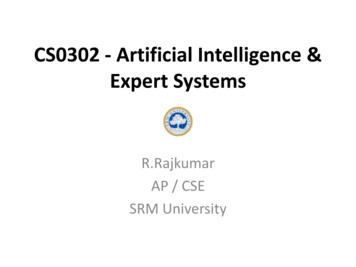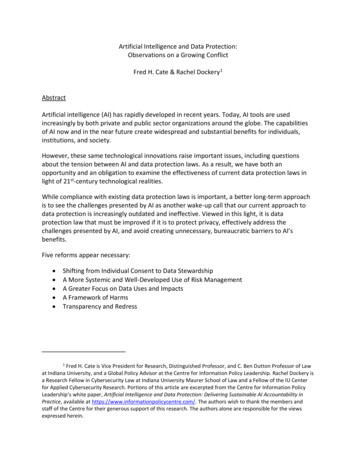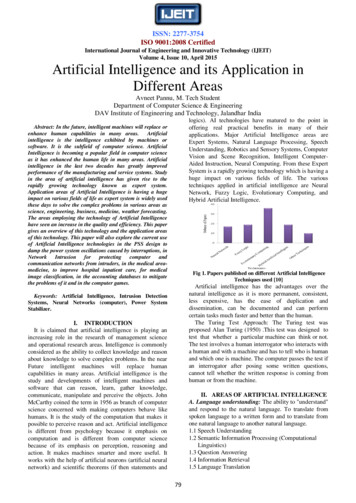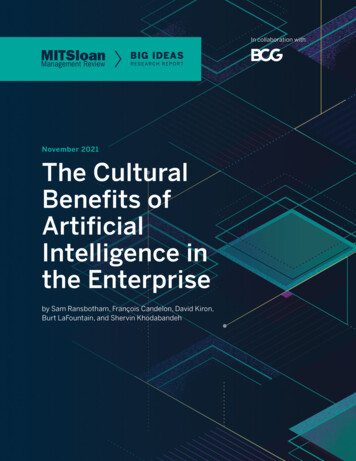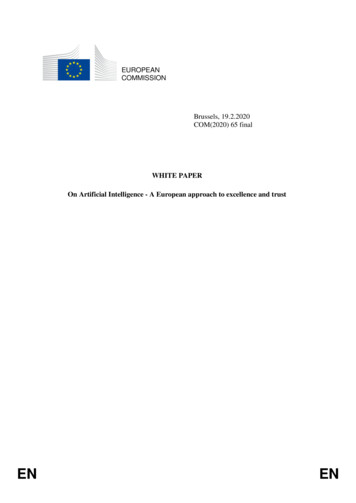
Transcription
EUROPEANCOMMISSIONBrussels, 19.2.2020COM(2020) 65 finalWHITE PAPEROn Artificial Intelligence - A European approach to excellence and trustENEN
White Paper on Artificial IntelligenceA European approach to excellence and trustArtificial Intelligence is developing fast. It will change our lives by improving healthcare (e.g. makingdiagnosis more precise, enabling better prevention of diseases), increasing the efficiency of farming,contributing to climate change mitigation and adaptation, improving the efficiency of productionsystems through predictive maintenance, increasing the security of Europeans, and in many other waysthat we can only begin to imagine. At the same time, Artificial Intelligence (AI) entails a number ofpotential risks, such as opaque decision-making, gender-based or other kinds of discrimination,intrusion in our private lives or being used for criminal purposes.Against a background of fierce global competition, a solid European approach is needed, building onthe European strategy for AI presented in April 20181. To address the opportunities and challenges ofAI, the EU must act as one and define its own way, based on European values, to promote thedevelopment and deployment of AI.The Commission is committed to enabling scientific breakthrough, to preserving the EU’stechnological leadership and to ensuring that new technologies are at the service of all Europeans –improving their lives while respecting their rights.Commission President Ursula von der Leyen announced in her political Guidelines 2 a coordinatedEuropean approach on the human and ethical implications of AI as well as a reflection on the betteruse of big data for innovation.Thus, the Commission supports a regulatory and investment oriented approach with the twin objectiveof promoting the uptake of AI and of addressing the risks associated with certain uses of this newtechnology. The purpose of this White Paper is to set out policy options on how to achieve theseobjectives. It does not address the development and use of AI for military purposes.The Commissioninvites Member States, other European institutions, and all stakeholders, including industry, socialpartners, civil society organisations, researchers, the public in general and any interested party, to reactto the options below and to contribute to the Commission’s future decision-making in this domain.1.INTRODUCTIONAs digital technology becomes an ever more central part of every aspect of people’s lives, peopleshould be able to trust it. Trustworthiness is also a prerequisite for its uptake. This is a chance forEurope, given its strong attachment to values and the rule of law as well as its proven capacity to buildsafe, reliable and sophisticated products and services from aeronautics to energy, automotive andmedical equipment.Europe’s current and future sustainable economic growth and societal wellbeing increasingly draws onvalue created by data. AI is one of the most important applications of the data economy. Today mostdata are related to consumers and are stored and processed on central cloud-based infrastructure. Bycontrast a large share of tomorrow’s far more abundant data will come from industry, business and thepublic sector, and will be stored on a variety of systems, notably on computing devices working at theedge of the network. This opens up new opportunities for Europe, which has a strong position in12AI for Europe, COM/2018/237 litical/files/political-guidelines-next-commission en.pdf.1
digitised industry and business-to-business applications, but a relatively weak position in consumerplatforms.Simply put, AI is a collection of technologies that combine data, algorithms and computing power.Advances in computing and the increasing availability of data are therefore key drivers of the currentupsurge of AI. Europe can combine its technological and industrial strengths with a high-qualitydigital infrastructure and a regulatory framework based on its fundamental values to become a globalleader in innovation in the data economy and its applications as set out in the European datastrategy3. On that basis, it can develop an AI ecosystem that brings the benefits of the technology tothe whole of European society and economy: for citizens to reap new benefits for example improved health care, fewer breakdowns ofhousehold machinery, safer and cleaner transport systems, better public services; for business development, for example a new generation of products and services in areaswhere Europe is particularly strong (machinery, transport, cybersecurity, farming, the greenand circular economy, healthcare and high-value added sectors like fashion and tourism); and for services of public interest, for example by reducing the costs of providing services(transport, education, energy and waste management), by improving the sustainability ofproducts4 and by equipping law enforcement authorities with appropriate tools to ensure thesecurity of citizens5, with proper safeguards to respect their rights and freedoms.Given the major impact that AI can have on our society and the need to build trust, it is vital thatEuropean AI is grounded in our values and fundamental rights such as human dignity and privacyprotection.Furthermore, the impact of AI systems should be considered not only from an individual perspective,but also from the perspective of society as a whole. The use of AI systems can have a significant rolein achieving the Sustainable Development Goals, and in supporting the democratic process and socialrights. With its recent proposals on the European Green Deal6, Europe is leading the way in tacklingclimate and environmental-related challenges. Digital technologies such as AI are a critical enabler forattaining the goals of the Green Deal. Given the increasing importance of AI, the environmentalimpact of AI systems needs to be duly considered throughout their lifecycle and across the entiresupply chain, e.g. as regards resource usage for the training of algorithms and the storage of data.A common European approach to AI is necessary to reach sufficient scale and avoid the fragmentationof the single market. The introduction of national initiatives risks to endanger legal certainty, toweaken citizens’ trust and to prevent the emergence of a dynamic European industry.This White Paper presents policy options to enable a trustworthy and secure development of AI inEurope, in full respect of the values and rights of EU citizens. The main building blocks of this WhitePaper are:3COM(2020) 66 final.AI and digitalisation in general are critical enablers of Europe’s Green deal ambitions. However, the current environmentalfootprint of the ICT sector is estimated at more than 2% of all global emissions. The European digital strategyaccompanying this White Paper proposes green transformation measures for digital.5 AI tools can provide an opportunity for better protecting EU citizens from crime and acts of terrorism.Such tools could, for example, help identify online terrorist propaganda, discover suspicious transactions in the sales ofdangerous products, identify dangerous hidden objects or illicit substances or products, offer assistance to citizens inemergencies and help guide first responders.6 COM(2019) 640 final.42
The policy framework setting out measures to align efforts at European, national and regionallevel. In partnership between the private and the public sector, the aim of the framework is tomobilise resources to achieve an ‘ecosystem of excellence’ along the entire value chain,starting in research and innovation, and to create the right incentives to accelerate the adoptionof solutions based on AI, including by small and medium-sized enterprises (SMEs). The key elements of a future regulatory framework for AI in Europe that will create a unique‘ecosystem of trust’. To do so, it must ensure compliance with EU rules, including the rulesprotecting fundamental rights and consumers’ rights, in particular for AI systems operated inthe EU that pose a high risk7. Building an ecosystem of trust is a policy objective in itself, andshould give citizens the confidence to take up AI applications and give companies and publicorganisations the legal certainty to innovate using AI. The Commission strongly supports ahuman-centric approach based on the Communication on Building Trust in Human-CentricAI8 and will also take into account the input obtained during the piloting phase of the EthicsGuidelines prepared by the High-Level Expert Group on AI.The European strategy for data, which accompanies this White Paper, aims to enable Europe tobecome the most attractive, secure and dynamic data-agile economy in the world – empoweringEurope with data to improve decisions and better the lives of all its citizens. The strategy sets out anumber of policy measures, including mobilising private and public investments, needed to achievethis goal. Finally, the implications of AI, Internet of Things and other digital technologies for safetyand liability legislation are analysed in the Commission Report accompanying this White Paper.2.CAPITALISING ON STRENGTHS IN INDUSTRIAL AND PROFESSIONAL MARKETSEurope is well placed to benefit from the potential of AI, not only as a user but also as a creator and aproducer of this technology. It has excellent research centres, innovative start-ups, a world-leadingposition in robotics and competitive manufacturing and services sectors, from automotive tohealthcare, energy, financial services and agriculture. Europe has developed a strong computinginfrastructure (e.g. high-performance computers), essential to the functioning of AI. Europe also holdslarge volumes of public and industrial data, the potential of which is currently under-used. It has wellrecognised industrial strengths in safe and secure digital systems with low-power consumption that areessential for the further development of AI.Harnessing the capacity of the EU to invest in next generation technologies and infrastructures, as wellas in digital competences like data literacy, will increase Europe’s technological sovereignty in keyenabling technologies and infrastructures for the data economy. The infrastructures should support thecreation of European data pools enabling trustworthy AI, e.g. AI based on European values and rules.Europe should leverage its strengths to expand its position in the ecosystems and along the value chain,from certain hardware manufacturing sectors to software all the way to services. This is alreadyhappening to an extent. Europe produces more than a quarter of all industrial and professional servicerobots (e.g. for precision farming, security, health, logistics.), and plays an important role indeveloping and using software applications for companies and organisations (business-to-businessapplications such as Enterprise Resource Planning, design and engineering software) as well asapplications to support e-government and the "intelligent enterprise".78Although further arrangements may need to be put in place to prevent and counter misuse of AI for criminal purposes, thisis outside the scope of this white paper.COM(2019) 168.3
Europe leads the way in deploying AI in manufacturing. Over half of the top manufacturers implementat least one instance of AI in manufacturing operations9.One reason for Europe’s strong position in terms of research is the EU funding programme that hasproven instrumental in pooling action, avoiding duplications, and leveraging public and privateinvestments in the Member States. Over the past three years, EU funding for research and innovationfor AI has risen to 1.5 billion, i.e. a 70% increase compared to the previous period.However, investment in research and innovation in Europe is still a fraction of the public and privateinvestment in other regions of the world. Some 3.2 billion were invested in AI in Europe in 2016,compared to around 12.1 billion in North America and 6.5 billion in Asia10. In response, Europeneeds to increase its investment levels significantly. The Coordinated plan on AI11 developed withMember States is proving to be a good starting point in building closer cooperation on AI in Europeand in creating synergies to maximise investment in the AI value chain.3.SEIZING THE OPPORTUNITIES AHEAD: THE NEXT DATA WAVEAlthough Europe currently is in a weaker position in consumer applications and on online platforms,which results in a competitive disadvantage in data access, major shifts in the value and re-use of dataacross sectors are underway. The volume of data produced in the world is growing rapidly, from 33zettabytes in 2018 to an expected 175 zettabytes in 2025 12 . Each new wave of data bringsopportunities for Europe to position itself in the data-agile economy and to become a world leader inthis area. Furthermore, the way in which data are stored and processed will change dramatically overthe coming five years. Today 80% of data processing and analysis that takes place in the cloud occursin data centres and centralised computing facilities, and 20% in smart connected objects, such as cars,home appliances or manufacturing robots, and in computing facilities close to the user (“edgecomputing”). By 2025 these proportions are set to change markedly13.Europe is a global leader in low-power electronics which is key for the next generation of specialisedprocessors for AI. This market is currently dominated by non-EU players. This could change with thehelp of initiatives such as the European Processor Initiative, which focuses on developing low-powercomputing systems for both edge and next generation high-performance computing, and the work ofthe Key Digital Technology Joint Undertaking, proposed to start in 2021. Europe also leads inneuromorphic solutions14 that are ideally suited to automating industrial processes (industry 4.0) andtransport modes. They can improve energy efficiency by several orders of magnitude.Recent advances in quantum computing will generate exponential increases in processing capacity15.Europe can be at the forefront of this technology thanks to its academic strengths in quantumcomputing, as well as European industry’s strong position in quantum simulators and programmingenvironments for quantum computing. European initiatives that aim to increase the availability ofquantum testing and experimentation facilities will help apply these new quantum solutions to anumber of industrial and academic sectors.9101112131415Followed by Japan (30%) and the US (28%). Source: CapGemini (2019).10 imperatives for Europe in the age of AI and automation, McKinsey (2017).COM(2018) 795.IDC (2019).Gartner (2017).Neuromorphic solutions means any very large-scale system of integrated circuits that mimic neuro-biological architecturespresent in the nervous system.Quantum computers will have the capacity to process in less than seconds many fold larger data sets than today’s highestperformance computers allowing for the development of new AI applications across sectors.4
In parallel, Europe will continue to lead progress in the algorithmic foundations of AI, building on itsown scientific excellence. There is a need to build bridges between disciplines that currently workseparately, such as machine learning and deep learning (characterised by limited interpretability, theneed for a large volume of data to train the models and learn through correlations) and symbolicapproaches (where rules are created through human intervention). Combining symbolic reasoning withdeep neural networks may help us improve explainability of AI outcomes.4.AN ECOSYSTEM OF EXCELLENCETo build an ecosystem of excellence that can support the development and uptake of AI across the EUeconomy and public administration, there is a need to step up action at multiple levels.A. WORKING WITH MEMBER STATESDelivering on its strategy on AI adopted in April 2018,16 in December 2018 the Commission presenteda Coordinated Plan - prepared together with the Member States - to foster the development and use ofAI in Europe17.This plan proposes some 70 joint actions for closer and more efficient cooperation between MemberStates, and the Commission in key areas, such as research, investment, market uptake, skills and talent,data and international cooperation. The plan is scheduled to run until 2027, with regular monitoringand review.The aim is to maximise the impact of investment in research, innovation and deployment, assessnational AI strategies and build on and extend the Coordinated Plan on AI with Member States: Action 1: The Commission, taking into account the results of the public consultation on theWhite Paper, will propose to the Member States a revision of the Coordinated Plan to beadopted by end 2020EU-level funding in AI should attract and pool investment in areas where the action required goesbeyond what any single Member State can achieve. The objective is to attract over 20 billion18 oftotal investment in the EU per year in AI over the next decade. To stimulate private and publicinvestment, the EU will make available resources from the Digital Europe Programme, HorizonEurope as well as from the European Structural and Investment Funds to address the needs of lessdeveloped regions as well as rural areas.The Coordinated Plan could also address societal and environmental well-being as a key principle forAI. AI systems promise to help tackling the most pressing concerns, including climate change andenvironmental degradation. It is also important that this happens in an environmentally friendlymanner. AI can and should itself critically examine resource usage and energy consumption and betrained to make choices that are positive for the environment. The Commission will consider optionsto encourage and promote AI solutions that do this together with the Member States.B. FOCUSING THE EFFORTS OF THE RESEARCH AND INNOVATION COMMUNITY161718Artificial Intelligence for Europe, COM(2018) 237.Coordinated Plan on Artificial Intelligence, COM(2018) 795.COM(2018) 237.5
Europe cannot afford to maintain the current fragmented landscape of centres of competence withnone reaching the scale necessary to compete with the leading institutes globally. It is imperative tocreate more synergies and networks between the multiple European research centres on AI and to aligntheir efforts to improve excellence, retain and attract the best researchers and develop the besttechnology. Europe needs a lighthouse centre of research, innovation and expertise that wouldcoordinate these efforts and be a world reference of excellence in AI and that can attract investmentsand the best talents in the field.The centres and the networks should concentrate in sectors where Europe has the potential to becomea global champion such as industry, health, transport, finance, agrifood value chains,energy/environment, forestry, earth observation and space. In all these domains, the race for globalleadership is ongoing, and Europe offers significant potential, knowledge and expertise 19 . Equallyimportant is to create testing and experimentation sites to support the development and subsequentdeployment of novel AI applications. Action 2: the Commission will facilitate the creation of excellence and testing centres that cancombine European, national and private investments, possibly including a new legalinstrument. The Commission has proposed an ambitious and dedicated amount to supportworld reference testing centres in Europe under the Digital Europe Programme andcomplemented where appropriate by research and innovation actions of Horizon Europe aspart of the Multiannual Financial Framework for 2021 to 2027.C. SKILLSThe European approach to AI will need to be underpinned by a strong focus on skills to fillcompetence shortages.20 The Commission will soon present a reinforcement of the Skills Agenda,which aims to ensure that everyone in Europe can benefit from the green and digital transformations ofthe EU economy. Initiatives could also include the support of sectoral regulators to enhance their AIskills in order to effectively and efficiently implement relevant rules. The updated Digital EducationAction Plan will help make better use of data and AI-based technologies such as learning andpredictive analytics with the aim to improve education and training systems and make them fit for thedigital age. The Plan will also increase awareness of AI at all levels of education in order to preparecitizens for informed decisions that will be increasingly affected by AI.Developing the skills necessary to work in AI and upskilling the workforce to become fit for the AIled transformation will be a priority of the revised Coordinated Plan on AI to be developed withMember States. This could include transforming the assessment list of the ethical guidelines into anindicative “curriculum” for developers of AI that will be made available as a resource for traininginstitutions. Particular efforts should be undertaken to increase the number of women trained andemployed in this area.In addition, a lighthouse centre of research and innovation for AI in Europe would attract talent fromall over the world due to the possibilities it could offer. It would also develop and spread excellence inskills that take root and grow across Europe.19The future European Defence Fund and Permanent Structured Cooperation (PESCO) will also provide opportunities forresearchanddevelopmentinAI.Theseprojectsshould be synchronized with the wider EU civilian programmes devoted to AI.20 ffer-and-demand-advanced-profiles-eu6
Action 3: Establish and support through the advanced skills pillar of the Digital EuropeProgramme networks of leading universities and higher education institutes to attract the bestprofessors and scientists and offer world-leading masters programmes in AI.Beyond upskilling, workers and employers are directly affected by the design and use of AI systems inthe workplace. The involvement of social partners will be a crucial factor in ensuring a human-centredapproach to AI at work.D. FOCUS ON SMESIt will also be important to ensure that SMEs can access and use AI. To this end, the DigitalInnovation Hubs 21 and the AI-on-demand platform 22 should be strengthened further and fostercollaboration between SMEs. The Digital Europe Programme will be instrumental in achieving this.While all Digital Innovation Hubs should provide support to SMEs to understand and adopt AI, it willbe important that at least one innovation hub per Member State has a high degree of specialisation inAI.SMEs and start-ups will need access to finance in order to adapt their processes or to innovate usingAI. Building on the forthcoming pilot investment fund of 100 million in AI and blockchain, theCommission plans to further scale up access to finance in AI under InvestEU 23 . AI is explicitlymentioned among the eligible areas for the use of the InvestEU guarantee. Action 4: the Commission will work with Member States to ensure that at least one digitalinnovation hub per Member State has a high degree of specialisation on AI. DigitalInnovation Hubs can be supported under the Digital Europe Programme. The Commission and the European Investment Fund will launch a pilot scheme of 100million in Q1 2020 to provide equity financing for innovative developments in AI. Subject tofinal agreement on the MFF, the Commission’s intention is to scale it up significantly from2021 through InvestEU.E. PARTNERSHIP WITH THE PRIVATE SECTORIt is also essential to make sure that the private sector is fully involved in setting the research andinnovation agenda and provides the necessary level of co-investment. This requires setting up a broadbased public private partnership, and securing the commitment of the top management of companies. Action 5: In the context of Horizon Europe, the Commission will set up a new public privatepartnership in AI, data and robotics to combine efforts, ensure coordination of research andinnovation in AI, collaborate with other public-private partnerships in Horizon Europe andwork together with the testing facilities and the Digital Innovation Hubs mentioned economy-make-mostdigital-opportunities.22 www.Ai4eu.eu.23 Europe.eu/investeu.7
F. PROMOTING THE ADOPTION OF AI BY THE PUBLIC SECTORIt is essential that public administrations, hospitals, utility and transport services, financial supervisors,and other areas of public interest rapidly begin to deploy products and services that rely on AI in theiractivities. A specific focus will be in the areas of healthcare and transport where technology is maturefor large-scale deployment. Action 6: The Commission will initiate open and transparent sector dialogues giving priorityto healthcare, rural administrations and public service operators in order to present an actionplan to facilitate development, experimentation and adoption. The sector dialogues will beused to prepare a specific ‘Adopt AI programme’ that will support public procurement of AIsystems, and help to transform public procurement processes themselves.G. SECURING ACCESS TO DATA AND COMPUTING INFRASTRUCTURESThe areas for action set out in this White Paper are complementary to the plan presented in parallelunder the European data strategy. Improving access to and the management of data is fundamental.Without data, the development of AI and other digital applications is not possible. The enormousvolume of new data yet to be generated constitutes an opportunity for Europe to position itself at theforefront of the data and AI transformation. Promoting responsible data management practices andcompliance of data with the FAIR principles will contribute to build trust and ensure re-usability ofdata24. Equally important is investment in key computing technologies and infrastructures.The Commission has proposed more than 4 billion under the Digital Europe Programme to supporthigh-performance and quantum computing, including edge computing and AI, data and cloudinfrastructure. The European data strategy develops these priorities further.H. INTERNATIONAL ASPECTSEurope is well positioned to exercise global leadership in building alliances around shared values andpromoting the ethical use of AI. The EU's work on AI has already influenced international discussions.When developing its ethical guidelines, the High-Level Expert Group involved a number of non-EUorganisations and several governmental observers. In parallel, the EU was closely involved indeveloping the OECD’s ethical principles for AI25. The G20 subsequently endorsed these principles inits June 2019 Ministerial Statement on Trade and Digital Economy.In parallel, the EU recognises that important work on AI is ingoing in other multilateral fora, includingthe Council of Europe, the United Nations Educational Scientific and Cultural Organization(UNESCO), the Organisation for Economic Co-operation and Development’s (OECD), the WorldTrade Organisation and the International Telecommunications Union (ITU). At the UN, the EU isinvolved in the follow-up of the report of the High-Level Panel on Digital Cooperation, including itsrecommendation on AI.The EU will continue to cooperate with like-minded countries, but also with global players, on AI,based on an approach based on EU rules and values (e.g. supporting upward regulatory convergence,accessing key resources including data, creating a level playing field). The Commission will closelymonitor the policies of third countries that limit data flows and will address undue restrictions in2425Findable, Accessible, Interoperable and Reusable as stated in the Final Report and Action Plan from the CommissionExpert Group on FAIR data, 2018, https://ec.europa.eu/info/sites/info/files/turning fair into reality ples/8
bilateral trade negotiations and through action in the context of the World Trade Organization. TheCommission is convinced that international cooperation on AI matters must be based on an approachthat promotes the respect of fundamental rights, including human dignity, pluralism, inclusion, nondiscrimination and protection of privacy and personal data26 and it will strive to export its valuesacross the world27. It is also clear that the responsible development and use of AI can be a drivingforce to achieve the Sustainable Development Goals and advance the 2030 Agenda.5.AN ECOSYSTEM OF TRUST: REGULATORY FRAMEWORK FOR AIAs with any new technology, the use of AI brings both opportunities and risks. Citizens fear being leftpowerless in defending their rights and safety when facing the information asymmetries of algorithmicdecision-making, and companies are concerned by legal uncertainty. While AI can help protectcitizens' security and enable them to enjoy their fundamental rights, citizens also worry that AI canhave unintended effects or even be used for malicious purposes. These concerns need to be addressed.Moreover, in addition to a lack of investment and skills, lack of trust is a main factor holding back abroader uptake of AI.That is why the Commission set out an AI strategy28 on 25 April 2018 addressing the socioeconomicaspects in parallel with an increase in investment in research, innovation and AI-capacity across theEU. It agreed a Coordinated Plan29 with the Member States to align strategies. The Commission alsoestablished a High-Level Expert Group that published Guidelines on trustworthy AI in April 201930.The Commission published a Communication31 welcoming the seven key requirements identified inthe Guidelines of the High-Level Expert Group: Human agency and oversight,Technical robustness and safety,Privacy and data governance,Transparency,Diversity, non-discrimination and fairness,Societal and environmen
White Paper on Artificial Intelligence A European approach to excellence and trust Artificial Intelligence is developing fast. It will change our lives by improving healthcare (e.g. making diagnosis more precise, enabling bette


